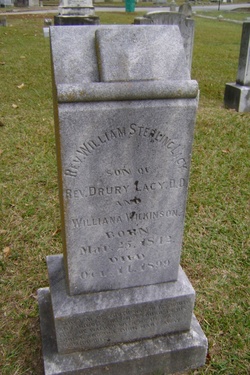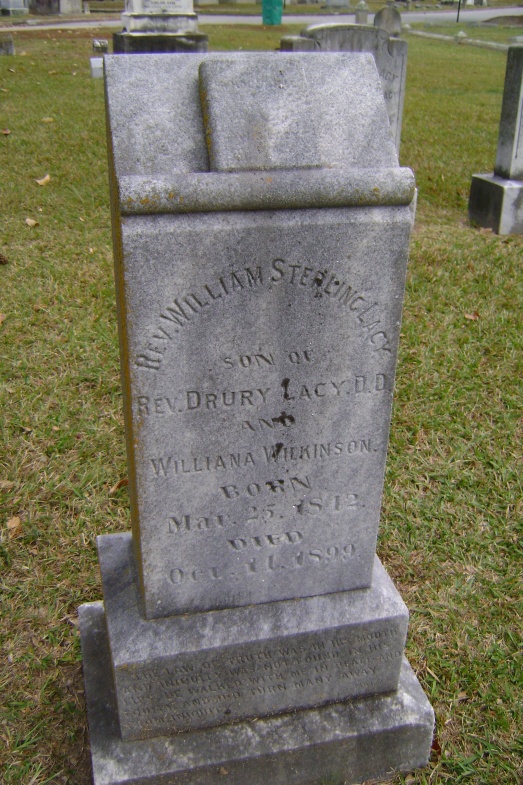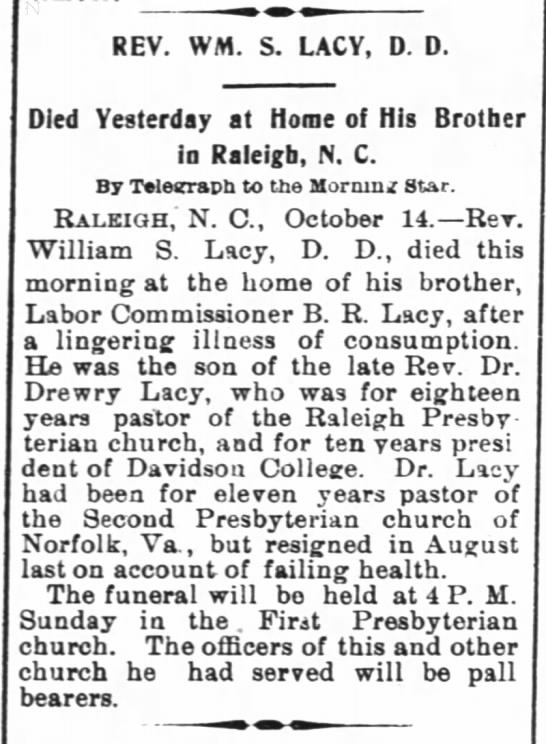He was the paternal grandson of Rev. Drury Lacy Sr. & Ann "Nancy Anna" Smith of Virginia, and later Philadelphia; and gr-grandson of William Lacy & Katherine Rice of New Hanover, Co. VA. He was a direct descendant of this family's patriarch, Thomas Lacy I (ca. 1649-1750) who immigrated to the Virgina Colonies from Wales ca. 1680. On his mother's side, he was the paternal grandson of William Wilkinson & Elizabeth Smith of Dinwiddie Co, VA.
Raised in Raleigh where his father was pastor of the Presbyterian Church, Willie was about 4 years old when his mother died of tuberculosis. At about age 7 his father remarried to Mary Ritchie Rice, who became a loving and beloved stepmother to the young man.
It was said he inherited his physical frame and appearance from his mother, and something of her refinement of manner and taste; and, no doubt, also the love of music and of verse. When William Lacy was thirteen years old, his father removed to the academic village of Davidson, as the president of the college. At the early age of seventeen, in 1859, he was graduated from the college, and went almost at once to Union Theological Seminary, at Hampden-Sidney, VA and began his preparation for the ministry.
His happy life in the seminary was interrupted by Civil War. Though unfit physically for the strenuous life of a soldier and the exposures of the camp, his convictions of right and his manliness soon led him, with his college and seminary companions, into the ranks of the Confederate army. He enlisted as a private in the Rockbridge Artillery, and served in the campaign of the Virginia Valley with unshrinking devotion. Wishing to preach the gospel rather than bear arms, he left the Virginia Regiment and became the Chaplain of the 47th North Carolina Regiment of Infantry. By his genial and loving spirit he ministered to both officers and enlisted men in camp, field, and hospital, winning their entire confidence and affection.
When the war closed he returned to Raleigh, and became a teacher of the young. Having been licensed to preach by the Presbytery of Roanoke, in Virginia on October 2, 1862, he was ordained to the ministry in April, 1869, by Abingdon Presbytery, and became the faithful pastor of the Anchor of Hope and Cove Churches, in Southwestern Virginia.
Though greatly attached to his people, and most zealously engaged in his work, he found the vigorous climate too severe for his health. In 1873 he resigned his pastorate, and returned to North Carolina, and became pastor of Buffalo and Euphronia Churches, in Moore County, where he had a happy and fruitful ministry for fifteen years.
In 1885 he was transferred to the church at Jonesboro, in the same Presbytery of Fayetteville. In June, 1888, he accepted the call of the Second Presbyterian Church, of Norfolk, Va., and remained in that charge for 11 years, with great desire and ardent zeal, he gave the most untiring devotion to all the duties of his ministry. It was the crowning period of his life and ministry.
On October 8, 1888, in the year in which he came to Norfolk, the 46-year old bachelor married 27-year old Mary Catherine Shepherd, of Jonesboro, NC, daughter of CSA Pvt. John James Shepherd (deceased) and his wife Mary Bryan. Catherine's mother had remarried in 1879 to widower Wesley Soule Russell of Gulf, Chatham County, who was from the start was a loving and providing father to the young girl. William found in Catherine a "good wife who is from the Lord," and a companion of congenial tastes, a prudent friend, and an invaluable assistant in his studies and labors, and especially in the pastoral work of his Norfolk ministry. The couple would have one known child, a son, William Lacy (c. 1889).
He preached sermons that were most carefully prepared, with scholarly exposition of the word, and faithful and earnest application. In pastoral service he excelled, knowing how to speak a word in season, and to comfort others with the comfort wherewith he was himself comforted of God. He had a facile and graceful pen, contributing papers of popular attractiveness and of influence to the church journals.
An excellent presbyter, familiar with the history, constitution and the rules of the church and its courts, and being neat and methodical in all his literary habits, he rendered valuable service as clerk. He was at different times the stated clerk of the Presbyteries of Abingdon and Norfolk, and of the Synod of North Carolina. From both of the Synods, North Carolina and Virginia, he had been for many years a director and trustee of Union Theological Seminary. He had an inherited acquaintance with this school of the prophets, and a profound interest in its welfare. For several years he had been also a trustee of the Assembly's Home and School at Fredericksburg. At the time of his death he was a valuable member of the Assembly's Committee on the Preparation of a HymnBook. He was himself the author of several excellent hymns and of church tunes that have found acceptance in the churches.
During his 11 years in Norfolk, William grew his church in strength of number, organization, and the congregation flourished under his intelligent and pious teachings. Sadly, William was forced to leave Richmond on August 15, 1899 because of seriously impaired health.
Since his young days at college, Dr. Lacy was the victim of some form of rheumatism, which again and again through the years brought periods of pain and of interruption in his work, and compelled him to seek change of location. Time after time he sought relief from various treatments. It bent his form and crippled his movements. It frosted his hair with a premature old age. It was a constant limitation put upon his life and energies. In some degree it gave disappointment, which was sustained by a cheerful piety, yet brought a measure of pathos to his character, and of tenderness to his ministry. It was the never-absent minor chord in a spirit and life that were naturally bright and cheerful. It brought his life to an earlier end, while yet in mental force and activity and in the unfailing zeal of a devoted service of Christ he was unwearied and in his prime.
He sought relief at the Clifton Springs Sanitarium; but rallying from a serious illness there, he returned to the North Carolina which he loved. At Raleigh, in the good home of a loving brother, he found most watchful and tender care in the few weeks of failing strength. At last, on October 14, 1899, surrounded by those who loved him, he passed away at age 57.
Willie Lacy, as so many loved to call him, was remembered by friends as child of grace since his early childhood. His faith abiding steadfast, his eye single, and his whole nature gladly consecrated. He was a devout man and full of the Holy Ghost, pure, gentle, affectionate, unworldly; simple in his habits and refined in his tastes; loving good men and women, loving music and hymns, loving humor and play, loving books, and most of all, loving Christ and his church. He loved much, and he was much loved. He had a large circle of friends most gratefully and tenderly attached to him.
By nature gentle, he was also by grace lowly-minded. Meek of speech and humble of spirit, he was not timid in duty. He proved his courage on the battle-field, and was faithful to principle in every emergency or conflict in the church. Without a vestige of self-assertion, it is most remarkable that the strong qualities of his Christian manhood found constant recognition among his friends and in the courts and affairs of the church.
Following his death, his 38-year widow, who never remarried, removed to Gulf, Chatham County, and resided with her widowed stepfather, a noted merchant, until her death in about 1934.
He was the paternal grandson of Rev. Drury Lacy Sr. & Ann "Nancy Anna" Smith of Virginia, and later Philadelphia; and gr-grandson of William Lacy & Katherine Rice of New Hanover, Co. VA. He was a direct descendant of this family's patriarch, Thomas Lacy I (ca. 1649-1750) who immigrated to the Virgina Colonies from Wales ca. 1680. On his mother's side, he was the paternal grandson of William Wilkinson & Elizabeth Smith of Dinwiddie Co, VA.
Raised in Raleigh where his father was pastor of the Presbyterian Church, Willie was about 4 years old when his mother died of tuberculosis. At about age 7 his father remarried to Mary Ritchie Rice, who became a loving and beloved stepmother to the young man.
It was said he inherited his physical frame and appearance from his mother, and something of her refinement of manner and taste; and, no doubt, also the love of music and of verse. When William Lacy was thirteen years old, his father removed to the academic village of Davidson, as the president of the college. At the early age of seventeen, in 1859, he was graduated from the college, and went almost at once to Union Theological Seminary, at Hampden-Sidney, VA and began his preparation for the ministry.
His happy life in the seminary was interrupted by Civil War. Though unfit physically for the strenuous life of a soldier and the exposures of the camp, his convictions of right and his manliness soon led him, with his college and seminary companions, into the ranks of the Confederate army. He enlisted as a private in the Rockbridge Artillery, and served in the campaign of the Virginia Valley with unshrinking devotion. Wishing to preach the gospel rather than bear arms, he left the Virginia Regiment and became the Chaplain of the 47th North Carolina Regiment of Infantry. By his genial and loving spirit he ministered to both officers and enlisted men in camp, field, and hospital, winning their entire confidence and affection.
When the war closed he returned to Raleigh, and became a teacher of the young. Having been licensed to preach by the Presbytery of Roanoke, in Virginia on October 2, 1862, he was ordained to the ministry in April, 1869, by Abingdon Presbytery, and became the faithful pastor of the Anchor of Hope and Cove Churches, in Southwestern Virginia.
Though greatly attached to his people, and most zealously engaged in his work, he found the vigorous climate too severe for his health. In 1873 he resigned his pastorate, and returned to North Carolina, and became pastor of Buffalo and Euphronia Churches, in Moore County, where he had a happy and fruitful ministry for fifteen years.
In 1885 he was transferred to the church at Jonesboro, in the same Presbytery of Fayetteville. In June, 1888, he accepted the call of the Second Presbyterian Church, of Norfolk, Va., and remained in that charge for 11 years, with great desire and ardent zeal, he gave the most untiring devotion to all the duties of his ministry. It was the crowning period of his life and ministry.
On October 8, 1888, in the year in which he came to Norfolk, the 46-year old bachelor married 27-year old Mary Catherine Shepherd, of Jonesboro, NC, daughter of CSA Pvt. John James Shepherd (deceased) and his wife Mary Bryan. Catherine's mother had remarried in 1879 to widower Wesley Soule Russell of Gulf, Chatham County, who was from the start was a loving and providing father to the young girl. William found in Catherine a "good wife who is from the Lord," and a companion of congenial tastes, a prudent friend, and an invaluable assistant in his studies and labors, and especially in the pastoral work of his Norfolk ministry. The couple would have one known child, a son, William Lacy (c. 1889).
He preached sermons that were most carefully prepared, with scholarly exposition of the word, and faithful and earnest application. In pastoral service he excelled, knowing how to speak a word in season, and to comfort others with the comfort wherewith he was himself comforted of God. He had a facile and graceful pen, contributing papers of popular attractiveness and of influence to the church journals.
An excellent presbyter, familiar with the history, constitution and the rules of the church and its courts, and being neat and methodical in all his literary habits, he rendered valuable service as clerk. He was at different times the stated clerk of the Presbyteries of Abingdon and Norfolk, and of the Synod of North Carolina. From both of the Synods, North Carolina and Virginia, he had been for many years a director and trustee of Union Theological Seminary. He had an inherited acquaintance with this school of the prophets, and a profound interest in its welfare. For several years he had been also a trustee of the Assembly's Home and School at Fredericksburg. At the time of his death he was a valuable member of the Assembly's Committee on the Preparation of a HymnBook. He was himself the author of several excellent hymns and of church tunes that have found acceptance in the churches.
During his 11 years in Norfolk, William grew his church in strength of number, organization, and the congregation flourished under his intelligent and pious teachings. Sadly, William was forced to leave Richmond on August 15, 1899 because of seriously impaired health.
Since his young days at college, Dr. Lacy was the victim of some form of rheumatism, which again and again through the years brought periods of pain and of interruption in his work, and compelled him to seek change of location. Time after time he sought relief from various treatments. It bent his form and crippled his movements. It frosted his hair with a premature old age. It was a constant limitation put upon his life and energies. In some degree it gave disappointment, which was sustained by a cheerful piety, yet brought a measure of pathos to his character, and of tenderness to his ministry. It was the never-absent minor chord in a spirit and life that were naturally bright and cheerful. It brought his life to an earlier end, while yet in mental force and activity and in the unfailing zeal of a devoted service of Christ he was unwearied and in his prime.
He sought relief at the Clifton Springs Sanitarium; but rallying from a serious illness there, he returned to the North Carolina which he loved. At Raleigh, in the good home of a loving brother, he found most watchful and tender care in the few weeks of failing strength. At last, on October 14, 1899, surrounded by those who loved him, he passed away at age 57.
Willie Lacy, as so many loved to call him, was remembered by friends as child of grace since his early childhood. His faith abiding steadfast, his eye single, and his whole nature gladly consecrated. He was a devout man and full of the Holy Ghost, pure, gentle, affectionate, unworldly; simple in his habits and refined in his tastes; loving good men and women, loving music and hymns, loving humor and play, loving books, and most of all, loving Christ and his church. He loved much, and he was much loved. He had a large circle of friends most gratefully and tenderly attached to him.
By nature gentle, he was also by grace lowly-minded. Meek of speech and humble of spirit, he was not timid in duty. He proved his courage on the battle-field, and was faithful to principle in every emergency or conflict in the church. Without a vestige of self-assertion, it is most remarkable that the strong qualities of his Christian manhood found constant recognition among his friends and in the courts and affairs of the church.
Following his death, his 38-year widow, who never remarried, removed to Gulf, Chatham County, and resided with her widowed stepfather, a noted merchant, until her death in about 1934.
Inscription
Son of Rev. Drury Lacy & Williana Wilkinson
Family Members
Advertisement
Advertisement













